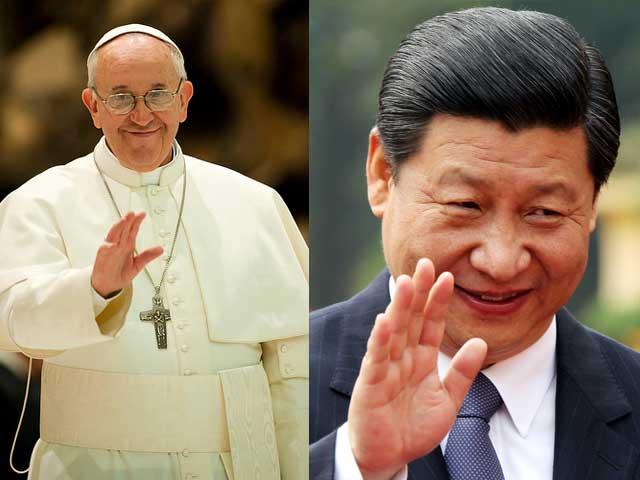The Pope and China's Communist Party: More Similar Than You Think

Pope Francis (L) (Catholic Church (England and Wales)/Flickr), and Xi Jinping disembarking a plane in Africa with his wife, Peng Liyuan (R). (Getty Images)
At the start of visits to China, I’m often awake in hotel rooms very early in the morning due to jetlag. With hours to kill until the street stalls selling steamed buns open, I flip through news channels comparing the way the stories of the day are treated on CNN, the BBC, and CCTV (Chinese state television). I’ll occasionally nod off during this boredom-battling exercise, or leave the television on as background noise while I leaf through a newspaper or click through a book on my Kindle. This kind of dazed and distracted bilingual channel surfing is always a bit disorienting, but it took on particularly surreal dimensions a month ago, when I happened to be in Shanghai when Xi Jinping’s installation as China’s new president neared and the selection of a new pope was underway. What made it so strange was how hard it could be to figure out at first, when I toggled between networks or woke up from a catnap, whether a newscaster was talking about Beijing or about Rome.
For example, in discussions of both Xi and the next pope (then still unidentified), broadcasters could be heard referring to a decision that would affect a population of over one billion people. They speculated on the likelihood that the new man in charge (no doubt about that the gender of the person selected in Rome would be the same as the one in Beijing) would be a “conservative” or a “reformer,” and also mused about whether his predecessor would fade away completely or exert some influence from behind the scenes. In both cases, Western reporters spoke of complex bureaucratic organizations that had been rocked by scandals, that many outsiders viewed as plagued by corruption, and that had traditionally been loathe to admit that they had made mistakes. Commentators also talked, in each case, of selection processes that were mysterious and cloaked in secrecy.
If the sound coming out of the television was Chinese, I generally thought it was safe to assume that a report on a change of leaders would be about Beijing rather than Rome. I was particularly confident about this after hearing a BBC report that described China as one of the only places in the world where there was relatively little interest in the conclave of cardinals. In the wee hours of the next morning, though, I woke up from dozing to find that CCTV was running a mini-documentary on how new popes are chosen.
I thought the overlaps between the two news stories and the ways they were covered were interesting enough to tweet about the parallels while in Shanghai. But while flying down to Hong Kong, I began to wonder whether my fascination with these analogies was due purely to the combination of a fluke of timing and jetlag-induced mental fuzziness. When I got to the former Crown Colony, though, and began to spend a bit of time navigating around its more easily accessed web, I learned that quite a few others had been commenting about the topic online in English and Chinese.
Since returning to the United States, I’ve continued to see occasional online references to similarities, despite the many obvious differences, between the two leadership transitions. One particularly interesting piece was a March 12 Australian op-ed that, among other things, pointed out that Richard McGregor’s 2010 book on China’s leaders, The Party, recounts a joke focusing on parallels a Chinese visitor to the Vatican drew between the inner circles of Rome and Beijing, such as that each had elaborate "propaganda" departments, albeit with different names. Another piece I came across and liked was a blog post by the talented translators, web-cullers and analysts at the Tea Leaf Nation site, which presented a series of highlights from comments on the analogy that were making the rounds on Weibo, China’s Twitter counterpart.
The main question I’ve been wrestling with post-jet lag is whether the parallels seem stronger or weaker now that a new pope has been chosen. I’m not sure, but I've decided that March brought us one quite striking new analogy to ponder and one new dramatic contrast to keep in mind.
The added parallel has to do with humility and embracing simpler and more down-to-earth modes of behavior. In the immediate aftermath of Xi’s rise to power as party head last November (he wasn’t formally installed as president until March, but his time at the top can be dated from late 2012), a lot was made of his call on his colleagues to scale back lavish official banquets and other symbols of elite indulgence. Similarly, some of the first stories about the new pope, including his actions over Easter, have emphasized things he has done in the name of simplicity.
The contrast is perhaps too obvious to be worth a mention. Namely, as I write this, the news about Xi Jinping largely focuses on something he’s been doing that his Communist Party predecessor may have only rarely done, but that no pope is likely ever to do — making a high-profile trip abroad with his wife.
Watch for the publication in June of the new edition of Jeffrey Wasserstrom's China in the 21st Century: What Everyone Needs to Know, a revised version of his 2010 Oxford University Press book, which he updated in collaboration with Maura Elizabeth Cunningham.


